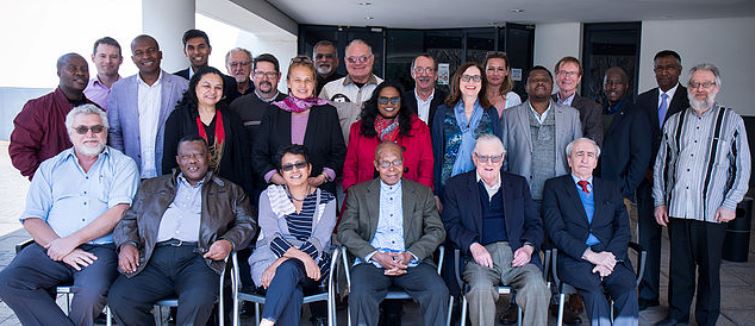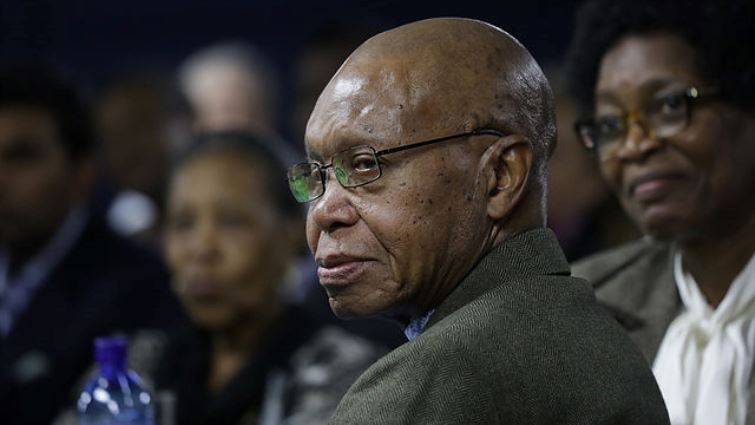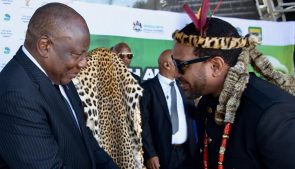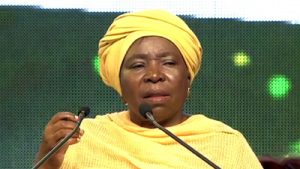The Press Council paid a moving tribute to revered veteran journalist Joe Thloloe at its annual general meeting. Joe is heading for retirement after involvement in journalism that spans well over half a century, from the struggle years through to the new democratic dispensation.
Joe Thloloe will still be involved in the council as a representative of the South African National Editors Forum.
Peter Mann, a member of the Press Council’s adjudication panel, said Joe has lived an unbelievable life. He remembers a casual conversation with him that describes Joe Thloloe’s experiences vividly.
“I remember standing with Joe at a Press Council event and we were at the Johannesburg Fort [old prison] and standing there, just chatting. There was a driveway up into the Fort,” Peter recounted.
Peter remembers Joe saying: “The first time they brought me here I was about 17 or 18 years old and they drove us up here in this black Maria and reversed into this driveway we are standing now. They pulled us out and that is where they started beating us.”
Joe Thloloe credits Matthew Nkoana with his first journalism lessons. These were taken in the dingy, bug infested cells of Boksburg Stoneyard Prison after his arrest during the anti-pass march.
The public editor at the council, veteran journalist Joe Latakgomo, appointed Joe as a dedicated labour reporter during the 1970s. Labour relations were at their lowest at time, workers trusted very few about their deliberations.
“He had to deal with people who were suspicious. And of course, Joe had political credentials to persuade people to give him information. I suspect quite a lot of that also shaped his own journalist direction,” Latakgomo said.
His reporting at the time coincided with a new wave of resistance during the infamous 1973 Durban wildcat strikes, which later flowed into the black consciousness agitation that culminated in the June 16 1976 uprising.
Retired journalist Mathatha Tshedu first heard of Joe Thloloe when he was president of the Union of Black Journalists. In the aftermath of the June 16 Joe was detained frequently.
Reports about his frequent arrests impressed a giant, larger than life legendary figure whose heroics preceded him. These completely overlooked Joe’s soft-spoken demeanor.
“When he came out of jail and he disappointed me by not being this towering giant we worked together within Media Workers Association of South Africa. Then he joined the Post in Transvaal [Gauteng] and we worked together there. He was writing a column at some point called Labour Watch,” Mathatha said.
Financial Mail editor Barney Mthombothi was part of that unpleasant collision as a member of MWASA. He said that is when many got to know Joe’s resilient leadership.
“I suppose 1981 was the watershed year, especially for the black press or black media workers in the country because at the time the bosses didn’t want to recognize our union. MWASA was an organization that not only represented journalists, it represented everybody who worked in the media,” Barney reflected.

Anton Harber, Caxton professor of journalism at Wits University, witnessed Joe’s leadership qualities in the 1980s when labour tensions in the media were heating up.
“There was a very unpleasant, difficult and long strike at the Post. That is where I first came into frequent contact and saw him as a leader and he very quickly won my respect and liking,” Anton said.
Anton said he had the pleasure of seeing how Joe operates. He admires how he has held onto the same set of values throughout.
“After the change and during the transition, many journalists who had opposed apartheid were bending over backwards to accommodate the new order because they had particular sympathies or because they had been involved in bringing about some compromised principles of media freedom. Joe was notable for standing by the same principles,” Anton added.
Raymond Louw, a founding member of the council, said through the years Joe earned his respect as a journalist of some considerable quality and and who did his job thoroughly.
“He was passionate about press freedom. And he believed that it was the cornerstone of democracy and absolutely essential in a country which was striving to be a democracy”. Louw added that during the struggle Joe also earned the dubious title of being the most detained journalist in the country.
Louw says he is however concerned about the formidable challenges to press freedom on the horizon.
“I am worried though in general about the future of the press because the government is in fact increasingly antagonistic towards the press. They have waiting in the wings a plan to introduce a media appeals tribunal which will take the place of the Press Council and result in government control of the press.”
Susan Smuts, the print media press representative at the council, lauds the spade work Joe and Raymond Louw put into the Press Council when it was first formed.
“Ray and Joe basically formed the Press Council into something that became coherent and quite effective. It wasn’t very clear at the beginning that they would be able to achieve that, but in retrospect they really did work wonders,” Smuts said
Smuts said the life of the Press Council was made much easier by Joe’s visionary leadership.
“He is somebody with a great deal of integrity, I think he has a vision and a way of being that is quite infectious,”Smuts added.
Many people who have worked with him closely say he is a soft-spoken conscientious person from whom it is very easy to learn. Current executive director of the Press Council Latiefah Mobara said Joe is a very good mentor.
“I think that that’s where Joe’s absolute skill lies, to teach skills without being patronizing.”
This is what has made it easy for the council’s case study officer, Khanyi Mndaweni, to draw lessons when Joe steadied the ship through turbulent times at the council. Quite notably when the council had a financial crisis.
“In the 10 years that I have worked with him I have never seen him angry I have never seen him lose his cool. I have never seen him anxious, he is always calm,” Khanyi said.
To some of his colleagues Joe leaves a tangible legacy they are eager to keep alive. Dinesh Balliah, a member of the council’s advisory committee, said Joe has little to worry about as he sails into the sunset.
“I think that he can be confident moving forward that we are in a safe space, we have learned from him. As an elder in this space he has done the right thing of passing on all that he has experienced,” Dinesh added. By Tebogo Gantsa






